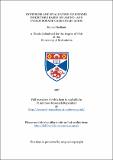Synthesis and evaluation of enzyme inhibitors based on amino- and cyclopropane carboxylic acids
Abstract
The coenzyme B12-dependent enzyme, glutamate mutase (E. C. 5.4.99.1), catalyses the reversible carbon-skeleton rearrangement of (2S)-glutamic acid to (25.35)-3-methylaspartic acid. Glutamate mutase is the first enzyme on the mesaconate pathway. A variety of glutamate and 3-methylaspartate analogues (which also include isotopically labelled molecules), were synthesised as molecular probes of the enzyme. Synthesis of stereospecifically labelled 3-ethylaspartic acid: (2S,3S)-[3'-C2H3], and (2S,3S)-[C2H2C2H3]-ethylaspartic acids were constructed using appropriately labelled iodoethane. (2S,3S)-2-Bromo-3-methylsuccinic acid was synthesised via the diazotization of (2S,3S)-3-methylaspartic acid, in the presence of bromide ion. (2S)-Methylsuccinic acid was synthesised by the catalytic hydrogenation of (2S,3S)-2-bromo-3-methylsucdnic acid. Biological studies of the synthesised compounds (including the labelled isotopomers) displayed no activity against glutamate mutase. 3-Methylaspartate ammonia-lyase, the second enzyme in the mesaconate pathway, catalyses the deamination of (2S,3S)-3-methylaspartic acid to mesaconic acid. A range of 1-substituted cyclopropane 1,2-dicarboxylic acids were synthesised using short efficient routes and were found to be good to potent inhibitors of 3-methylaspartase. X-ray crystallographic studies have determined the absolute stereochemistry. The mode of action of the most potent inhibitor, (1S,2S)-1-methylcyclopropane 1,2-dicarboxylic acid (20 mumol dm-3), is consistent with it acting as a transition state analogue for the central substrate deamination reaction catalysed by the enzyme. beta-Amino acids are constituents of many biologically active peptides. A general procedure for the synthesis of alpha-substituted-beta-amino acids has been developed. The synthesis involves a Baylis-Hillman amine catalysed conversion of methyl acrylate, with an appropriate aldehyde, to give the alpha-(hydroxyalkyl) acrylate. Bromination and subsequent azide displacement furnishes the azido alkene, which is catalytically hydrogenated, to furnish the beta-amino ester.
Type
Thesis, PhD Doctor of Philosophy
Collections
Items in the St Andrews Research Repository are protected by copyright, with all rights reserved, unless otherwise indicated.

